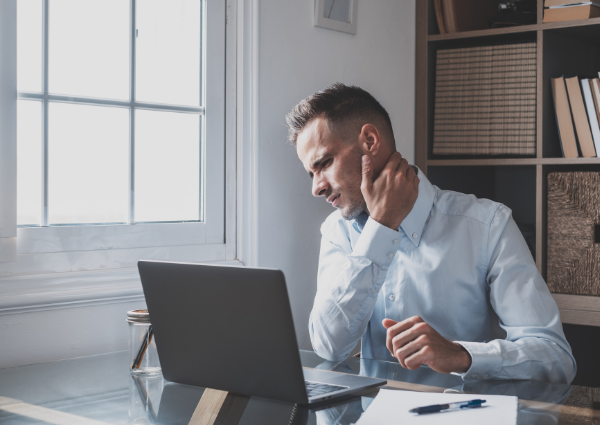How to Get Rid of Pain in Neck and Shoulder Radiating Down Arm

It is common to experience neck pain that radiates through your shoulder and down your arm. This is called cervical radiculopathy or popularly known as pinched nerves.
This pain may come and go on its own, but it might need to be looked at by a professional in some cases.
If you are feeling bothered by this sort of pain, then this complete guide is right for you! We will explain how these at-home remedies can help if you have cervical radiculopathy.
What Is Cervical Radiculopathy?
Cervical radiculopathy is also referred to as a pinched nerve. This happens when a nerve in the neck has been irritated or is compressed where it moves away from the spinal cord. This pain from cervical radiculopathy can radiate into the shoulder, cause arm pain, and cause muscle weakness.
Causes
A pinched nerve can happen because of the weathering of our spinal cord as we age. An example of this would be arthritis. However, many young people can have cervical radiculopathy from a sudden injury.
How To Treat Cervical Radiculopathy (Pain in Neck and Shoulder Radiating Down Arm)

There are many ways that people can relieve their pain while at home. These are some of the ways people can do that:
Get Some Sleep
When it comes to nerve roots, sleep and rest are the first things someone should do. The body will repair itself while someone sleeps because it gives it more time to reduce any symptoms.
[Read: Got Neck Pain After Sleeping? Wake Up Pain-Free With These 6 Tips]
Change Your Posture
Another reason why nerve compression can happen is because of our posture. If you have poor posture and stay in that position for an extended period, you are more likely to get cervical radiculopathy. Make sure you are always sitting in the right position.
Ensure to sit all the time correctly, especially when you have neck pain. This will help alleviate any discomfort you may have.
Stretching or Yoga
Gentle stretching or yoga can help loosen your neck muscles to release the nerve root from its position. Also, stretching out your shoulder blade can help remove sharp pain from your shoulders.
[For more home remedies for pinched nerves, read here]
What Happens If the Pain Doesn’t Go Away?
It has been recommended that people suffering from cervical radiculopathy for more than a few days should seek medical attention.
A neck doctor is the right person to help you figure out what is causing this pain and how to relieve it quickly. The doctor may want you to receive an MRI or CT scan so that they can have a better look at the neck muscles, nerve root, spinal canal, and the affected nerve. The doctor may complete three courses of treatment depending on the condition of your nerve roots.
Physical Therapy
Seeing a physical therapist will help you learn the different exercises that you can do to strengthen and stretch your muscles. Also, the physical therapist might make suggestions for your daily activities. They are the professionals that will know if you’re not sitting in your chair correctly.
Medications
Many doctors will prescribe anti-inflammatory medication, like Advil or Aleve, to help relieve pain. The doctor can give you other prescription medications that have been specifically made to help with any pain in the cervical spine.
Surgery
If the spinal cord compression has not fixed itself after a couple of weeks to a few months, surgery may need to occur. However, depending on what is causing the pain, surgery may mean that bone spurs or a bulging or herniated disk may need to be removed. Different surgical methods can happen to help relieve this pain.
Frequently Asked Questions

When Should I Go to the ER for Neck and Shoulder pain?
If you are suffering from any of the following symptoms with your neck and shoulder pain, then you should go to the ER right away:
- Fever, headache, and neck stiffness: When all three of these symptoms arise, it might be pointing to bacterial meningitis, which is an infection in the spinal cord and the brain. This needs to be looked at by a medical professional right away, so antibiotics can be distributed.
- The pain is traveling down one arm: If the pain is traveling down one arm and your hand feels either weak, tingly, or numb – you should go to the ER. This might mean that you have a herniated disk pressing on your spinal nerve roots.
- You can no longer control your bowel or bladder: If you cannot control your bladder or bowel movements, this indicates that there is pressure on your spinal cord. Immediate medical attention is needed.
- Unstable movements: This usually happens after a significant impact, but if you can move your head forward or backward a lot further than you’re used to, you might have a fracture or torn ligament. A doctor will need to get an X-ray done before thinking about surgical treatment.
- Your neck glands are constantly swollen: When your neck glands are swollen for a long period, it could mean that you have an infection or a tumor.
- Chest pain: Many people who experience a heart attack can feel pain in their neck, shoulder, and left arm. If this happens to you, you should call emergency services right away.
How Long Does This Shoulder and Neck Pain Last?
Most of the time, cervical radiculopathy is temporary and can be treated at home. However, if the symptoms are persistent, you should go to a doctor and have a medical examination done.
What Happens if This Pain in Your Neck Goes Untreated?
In many cases, cervical radiculopathy does go away on its own. This can be done with at-home treatment or over-the-counter medication. However, if your neck pain is persistent for a few weeks, you will need to see a neck doctor.
If cervical radiculopathy goes untreated, it can cause serious health problems like disc degeneration or peripheral neuropathy. However, a professional will be able to relieve pain from the area to get back to your daily activities.
Don’t Let Your Pinched Nerve Ruin Your Routine
When you have cervical radiculopathy, many at-home remedies can help relieve the pain, but if it persists, you should see a medical professional. If you are located in Prescott, Arizona, you can always see us at VISP. We specialize in completing minimally invasive and low-risk procedures that will help you get back to your routine.
Every team member is professional, passionate, and experienced in this field, so you can have peace of mind when you’re here. If you have any questions, you should call us at (928) 771-8477.
Vascular & Interventional Specialists of Prescott was formed in 2010 by a group of subspecialty radiologists that perform numerous minimally-invasive, low-risk procedures using the tools of our trade for guidance—x-ray, ultrasound, CT scan, and MRI. The team’s goal is to educate patients and medical communities, while also providing safe and compassionate health care, with rapid recovery times and low risk of complications.
